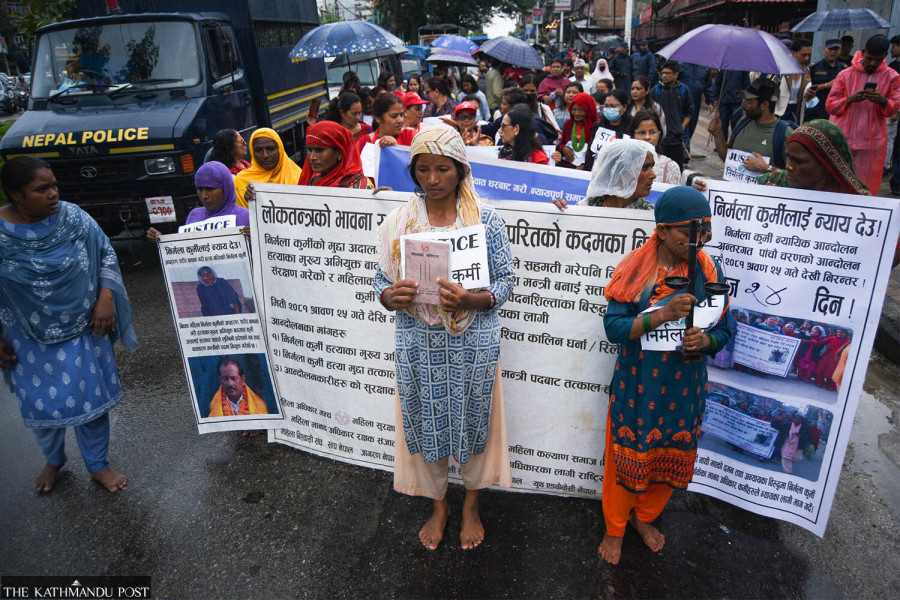National
Nirmala Kurmi supporters nudge rights watchdog for action against Banke Nepali Congress leader
They have been staging protests for 42 days, demanding legal action againstBadshah Kurmi, the prime suspect in the disappearance of Nirmala.
Post Report
The Ruby Khan-led Mahila Adhikar Manch—literally, women’s rights forum—has filed a complaint against Banke police and the district attorney at the National Human Rights Commission for their reluctance to lodge cases against Nepali Congress leader Badshah Kurmi.
Forteeen protesters have been staging a sit-in at Maitighar in Kathmandu since August 9, demanding Badshah be sacked as a minister from the Lumbini provincial government and lodging a case against him in Banke district court. Though he stepped down as a minister last week following the protest, no cases have been filed against him.
Badshah, a Nepali Congress leader and Lumbini provincial assembly member, is the prime accused in Nirmala Kurmi’s disappearance and capture of her property. Nirmala, a resident of Banke district, disappeared mysteriously in 2010 and remains missing.
“The chief of Banke police and the district attorney have been creating obstacles for justice by not filing a court case in Nirmala Kurmi's case,” reads the complaint filed by the Manch, urging the commission to take action against them.
Banke-based human rights activists have been staging protests regularly for 42 days, demanding to proceed to legal action against the Congress leader. “Badshah had to resign following our protest,” Khan said. “We will not give up unless the case against him reaches the court.”
The protesters walk barefoot every day from Kalanki to Maitighar before commencing their indefinite sit-in at Maitighar and walking back. The government has made no overtures for dialogue yet.
This is the fourth time they have been in the federal capital demanding justice for Nirmala.
The protesters have been claiming that by refusing to implement past deals, successive governments have proved that they are not accountable to the people and not bothered about upholding the rule of law.
They first started their protests in October 2021 as a group of 14 people, including 11 women, who arrived in Kathmandu from Nepalgunj, covering over 500 kilometres on foot in the quest for justice for two women victims of murder and disappearances. They had to march to Kathmandu after the local administration paid no attention to their protest.
After 12 days of sit-ins and a hunger strike in 2021, the government had agreed to investigate the case of Nirmala, who disappeared mysteriously in 2010. Nepali Congress President Sher Bahadur Deuba was the prime minister at the time.
Badshah is the prime accused in Nirmala’s disappearance and capture of her property. Ignoring the agreement it had signed with Ruby Khan, the Congress fielded Badshah in the provincial assembly elections in November 2023. He won.
One and a half years later, on July 23, the country’s biggest party made him a minister in the province. But he had to resign in less than two months.
After around three weeks of protest, the Pushpa Kamal Dahal-led government had reached a five-point deal with Khan in the last week of June. This included completing the investigation of Nirmala’s disappearance without delay.
Based on the agreement in October 2021, the government had formed a committee led by Hira Lal Regmi, then a joint-secretary at the home ministry.
The committee, in its report submitted to erstwhile minister for home affairs Bal Krishna Khand, had recommended the arrest of, and investigation into, eight people for their alleged involvement in Nirmala’s disappearance.
The police arrested seven, who were later released, but they never arrested the Congress leader. Badshah was also a Constituent Assembly member and an influential Congress leader in Banke.
With the government’s reluctance to implement the Regmi panel’s recommendations, Khan, accompanied by 15 others, walked to Kathmandu on foot from Banke and started the sit-in in the Capital on November 25, 2021. They withdrew their protest on the 42nd day, after the government agreed to get the Central Investigation Bureau of Nepal Police to investigate Nirmala’s disappearance, implement the home ministry’s probe report and provide security to the protesters.
Nirmala, 52, had gone missing in January 2010 from Janaki Rural Municipality in Banke. Her disappearance came to light two years after her two teenage sons were murdered in the span of a week.
The constitutional human rights watchdog had in June directed the government to present a progress report on the agreements.
The government has ignored the directive by refusing to report to the commission.




 13.12°C Kathmandu
13.12°C Kathmandu













